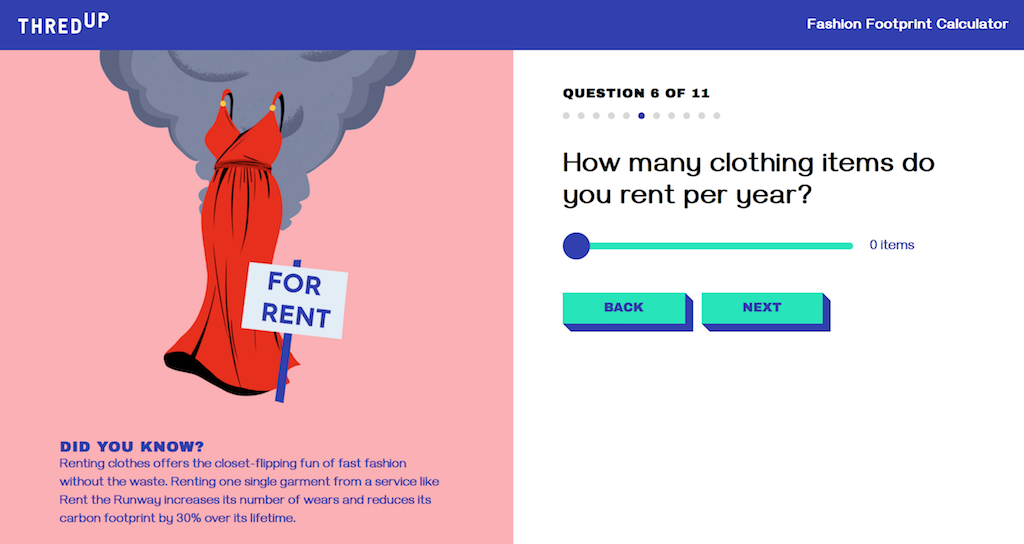3 Mins Read
ThredUP, the world’s largest fashion resale platform, has just launched a new tool called the Fashion Footprint Calculator to help customers understand the environmental cost of their fashion choices. Developed in collaboration with California-based carbon calculating startup Green Story, the tool estimates users’ personal environmental impact based on how they shop and take care of their clothes.
The newly debuted Fashion Footprint Calculator by ThredUP and Green Story involves answering 11 questions, starting with how many items customers buy each year, whether you use rental platforms and how many times you return online-bought clothing items. It also asks users about laundry habits, whether they dry clean, and if they ever purchase from sustainable fashion brands. Using this information, the calculator then identifies your individual fashion footprint and compares it to the average consumer, who contributes a whopping 1,620 pounds of carbon emissions per year only through their fashion choices.

The Fashion Footprint Calculator doesn’t just help users understand the environmental impact of their individual fashion choices, but provides tips to reduce that footprint. Unsurprisingly, as a second-hand fashion platform, ThredUP encourages shoppers to opt for resold items instead of new items. But in addition to this, the feature points out that certain items are more carbon intensive to produce, such as jeans, which require around 4 or 5 times as much carbon emissions to produce compared to a T-shirt. It also suggests users opt for online shopping if their nearest in-store shop requires a long drive, and to choose to skip express shipping to drive down the emissions from transportation as much as possible.
Read: 5 second-hand fashion platforms in Asia for your sustainable online shopping fix
Founded in 2009, ThredUP has become one of the world’s best known thrift consignment fashion platforms, selling preloved garments at a fraction of the price. It has since raised more than US$ 300 million in capital funding with investment from big institutional names such as Goldman Sachs, Upfront Ventures and Highland Capital Partners. The mission of ThredUP is to promote a circular economy for the fashion industry and increase the lifespan of products that are worn less and quickly thrown away.
According to a report from the United Nations, the average consumer today buys 60% more fashion pieces than they did 15 years ago, and keeps each item for half as long before throwing it out. When multiplied by millions of shoppers, the fashion industry leaves a devastating impact on our planet. According to the Ellen McArthur Foundation, a truckload of textile waste is dumped into landfills every single second.
Read: 2020 will be the year of sustainable fashion

And it isn’t just the waste aspect – the manufacturing of textiles generates massive amounts of greenhouse gases that are driving climate change, with a United Nations report highlighting that the industry is responsible for a whopping 10% of global carbon emissions, more than the airline and maritime shipping industry combined. It also produces around 20% of the world’s wastewater as manufacturing textiles often involves toxic contaminants such as synthetic dyes and bleaches.
Given these astonishing numbers, consumers are waking up to the fact that their shopping habits matter. In a bid to lower their fashion footprint, shoppers all over the world are opting for more sustainable choices such as resale, rental and upcycled brands. Already, big industry names are hopping on the trend, such as H&M and sister brand COS offering rental and repair services, and Asian e-commerce giant Zalora now offering a preloved collection. Even the hospitality business is catching on, with W Hotels group recently launching a rental travel wardrobe concept in partnership with rental platform Rent The Runway.
All images courtesy of ThredUP.




